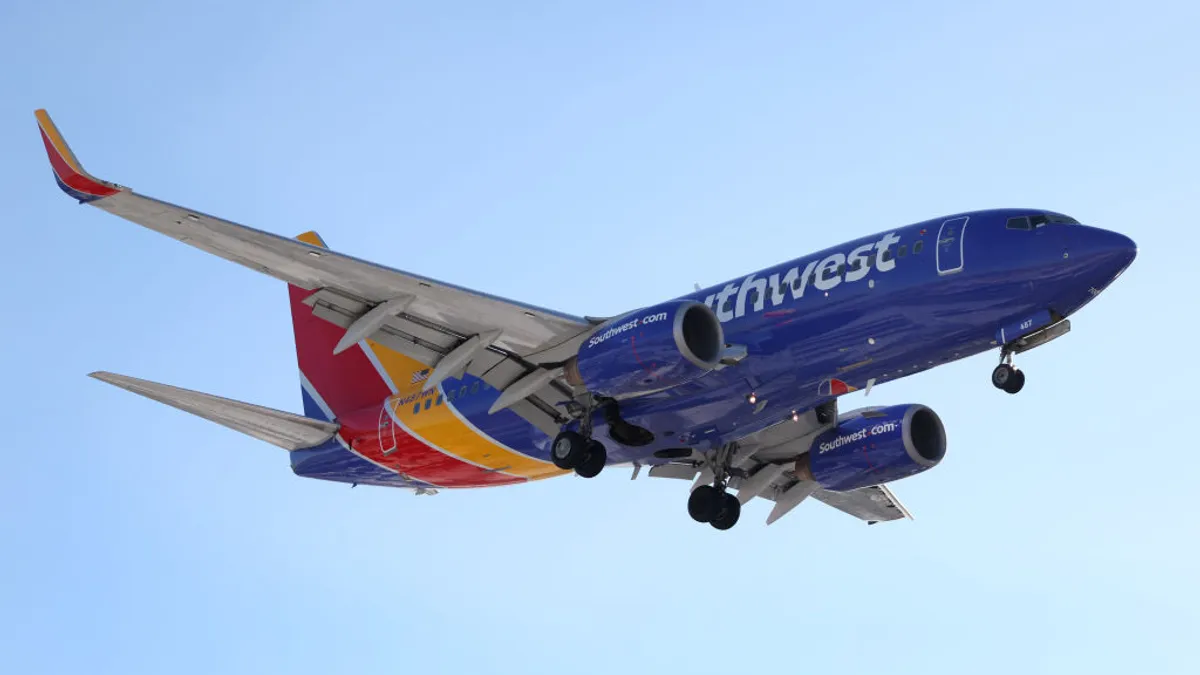In a week when Southwest Airlines announced a “reconstituted board” amid a director shakeup stemming from a settlement reached with an activist investor, the Dallas-based airline also detailed the compensation and travel perks that its board members receive.
The terms of current compensation for “non-employee” board members include: an annual retainer fee of $90,000 and $1,500 for each not regularly scheduled board or committee meeting, according to a Thursday securities filing. Members are also eligible for equity grants (which had a $170,000 grant date value this year), and those who serve at least five or 10 years are eligible for a cash payment of $35,000 or $75,000, respectively, as of their retirement date.
In addition, while serving on the board the members’ benefits include free travel on Southwest for the director, director’s spouse, and children as well as 50 one-way “unrestricted” free Southwest flight passes annually; and, subsequent to board service those directors who have logged at least 10 terms get “lifetime free travel” on Southwest Airlines for themselves and their spouses, according to the filing.
An analyst and corporate governance expert differed as to how the terms compare to those of other firms. Charles Elson, founding director of the Weinberg Center for Corporate Governance at the University of Delaware, said the retainer and stock grant were not unusual, noting that companies do sometimes provide discounts on their products of some kind to board members.
But he said retirement pay for board members has largely been phased out by many companies and he noted that the volume of free travel benefits for members’ friends and family offered by Southwest was unusual. “I can understand giving a discount on flights but free travel for that many people and being able to take friends and family — that’s bizarrely generous,” Elson said in an interview.
Nicolas Owens, an industrial equity analyst at Morningstar who covers Southwest, agreed that the lifetime travel for long-tenured board members is “a little bit unusual,” but said that it doesn’t cost the company much. Overall, he said he did not think the board compensation was “lavish or outlandish” as compared to that offered by other U.S. airlines or corporations. “These expenses don’t affect the operating profit of the company in any meaningful way,” Owens wrote in an emailed response to questions.
A Southwest spokesperson declined to comment beyond the filing. Elliott did not respond to a request for comment.
Southwest provided the details on its board compensation on the same day that it announced it was appointing six new independent directors to its board, effective as of Nov. 1, in connection with an agreement it reached with the active investor Elliott Investment Management. Among the new members appointed to the board is Pierre Breber, formerly CFO of the oil firm Chevron, the company said.
Meanwhile, Southwest’s Executive Chairman Gary Kelly will accelerate his retirement and step down from the board, also effective Nov. 1, and then assume the title of chairman emeritus, the company said. As previously announced, six other Southwest directors will retire on the same date and the board will be reduced to 13 members, according to the release.
“We are pleased to have reached a collaborative resolution with Elliott, continuing our Board refreshment with the addition of new directors who bring complementary skills and experience,” Kelly, who was also formerly Southwest’s CEO, said in a statement in the release. “I am confident this Board will continue to hold the leadership team accountable for executing its transformational plan and delivering financial performance.”
Elliott Partner John Pike and Portfolio Manager Bobby Xu also said they were pleased to have reached the agreement with Southwest on the addition of the six new directors to “revitalize the board.”
The move amounts to a “truce” between the airline and Elliott, giving the investor board presence but not the majority control it sought, according to The Wall Street Journal, which also reported that the settlement announced Thursday ends an “acrimonious four-month battle over whether Southwest’s management is capable of pulling the airline out of a funk.”
In recent years, as industry operating costs rose, Southwest’s profitability has faced competition from low-fare and legacy airlines and was also the target of a pressure campaign waged by Elliott, according to a Thursday Morningstar report.
“On Oct. 24, Elliott and Southwest announced a compromise: The airline will appoint six directors, five of whom are Elliott's nominees. Former CEO Gary Kelly will retire this year instead of next year, and CEO Bob Jordan will keep his job. We believe the business plan was mostly of Southwest's making,” the report states, adding that Southwest included more details about its new plan in its Q3 report, with management asserting it expects to deliver $4 billion of incremental profit by 2027, while also pursuing a new seating plan, improved marketing and some plane sales.




















